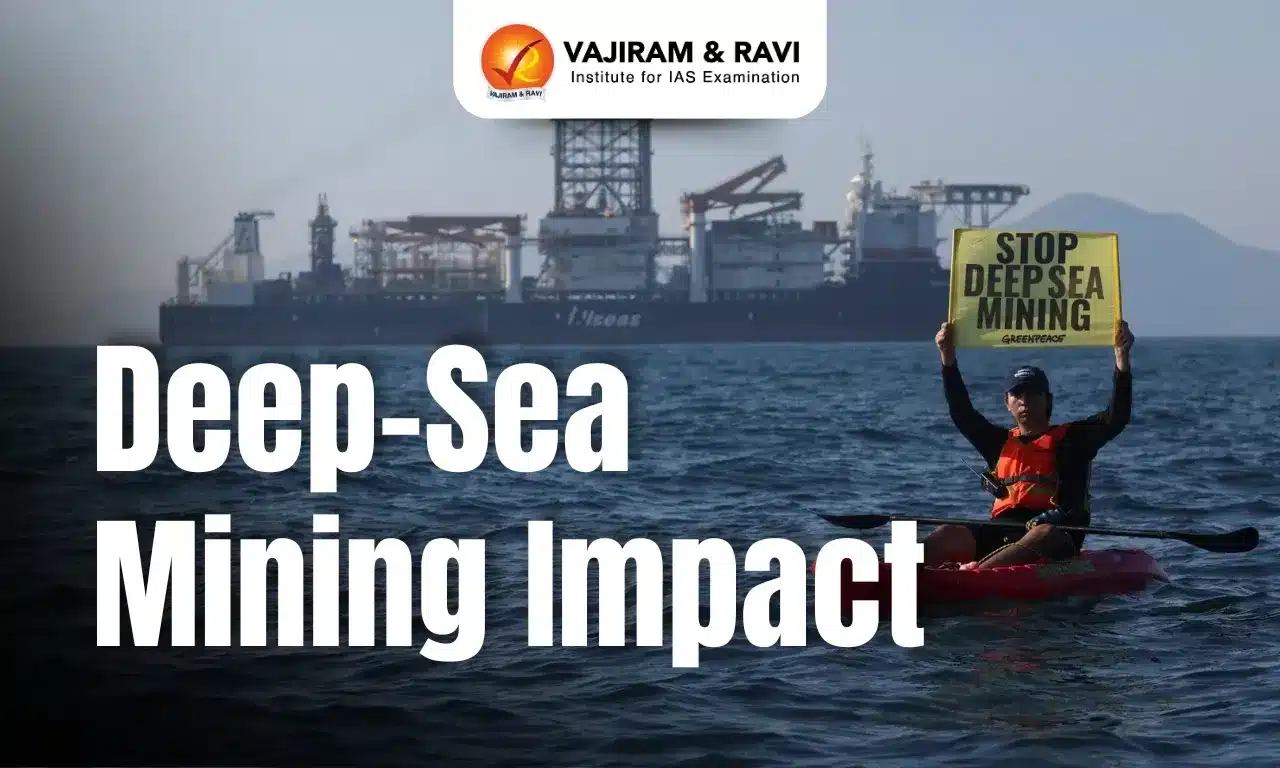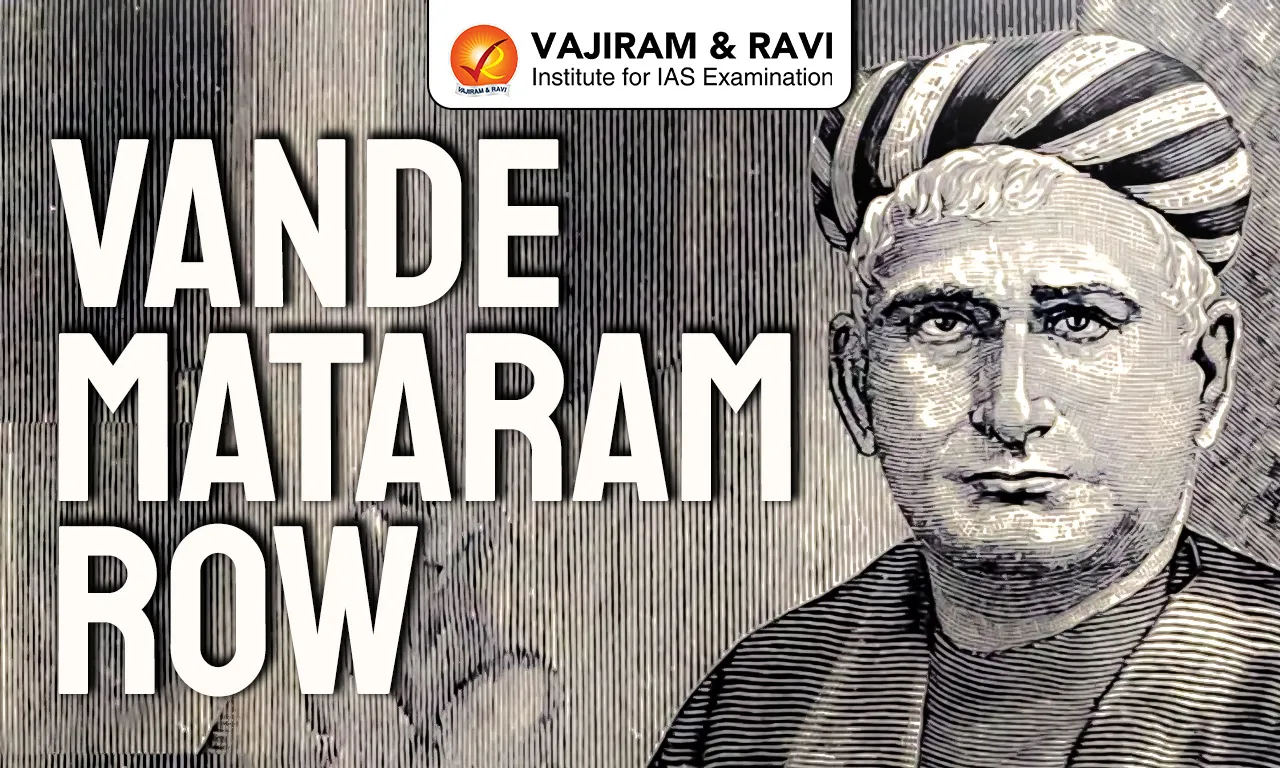What’s in Today’s Article?
- Deep-Sea Mining Impact Latest News
- Deep Sea Mining
- Key Findings of the Study
- Deep-Sea Mining and Its Future
- Deep-Sea Mining Impact FAQs
Deep-Sea Mining Impact Latest News
- A new study, ‘Long-term impact and biological recovery in a deep-sea mining track’, published in Nature, reveals that a section of the Pacific Ocean seabed mined over 40 years ago has not yet recovered.
- Conducted by scientists led by Britain’s National Oceanography Centre, the study found long-term sediment changes and a decline in larger marine organisms.
- The findings come amid increasing calls for a moratorium on deep-sea mining. Recently, 36 countries attended a UN International Seabed Authority meeting in Jamaica to discuss whether mining companies should be permitted to extract metals from the ocean floor.
Deep Sea Mining
- Deep sea mining involves extracting mineral deposits and metals from the ocean’s seabed.
- It is classified into three types:
- Collecting polymetallic nodules from the ocean floor
- Mining massive seafloor sulphide deposits
- Stripping cobalt crusts from underwater rocks
Significance of Deep Sea Mining
- These deposits contain valuable materials like nickel, rare earth elements, and cobalt, which are essential for renewable energy technologies, batteries, and everyday electronics such as cellphones and computers.
Technological Developments in Deep Sea Mining
- The engineering methods for deep sea mining are still evolving. Companies are exploring:
- Vacuum-based extraction using massive pumps
- AI-driven deep-sea robots to selectively pick up nodules
- Advanced underwater machines to mine materials from underwater mountains and volcanoes
Strategic Importance
- Governments and companies see deep sea mining as crucial due to depleting onshore reserves and rising global demand for these critical materials.
Key Findings of the Study
- The study examined the long-term impact of a small-scale mining experiment conducted in 1979 on a section of the Pacific Ocean seafloor.
- The experiment involved removing polymetallic nodules, and scientists analyzed the affected 8-meter strip during an expedition in 2023.
Key Findings
- Long-Term Environmental Impact: The mining led to lasting changes in the sediment and a decline in marine organism populations.
- Partial Recovery Observed: While some areas showed little to no recovery, certain animal groups were beginning to recolonize and repopulate.
Broader Concerns About Deep Sea Mining
- Previous studies have warned about negative effects of deep sea mining below 200 meters, including:
- Harmful noise and vibrations
- Sediment plumes and light pollution
- A 2023 study in Current Biology found that deep sea mining significantly reduces animal populations and has a wider ecological impact than previously estimated.
Significance for Policy and Environmental Debate
- The study provides crucial data for assessing the long-term effects of deep-sea mining and guiding future regulations by the International Seabed Authority (ISA).
- Findings suggest that while some marine life begins to recover, full ecosystem restoration remains uncertain and may take decades.
- The research forms part of the Seabed Mining and Resilience to Experimental Impact (SMARTEX) project, which aims to support informed decision-making on deep-sea mining’s societal and ecological implications.
Deep-Sea Mining and Its Future
- The Clarion Clipperton Zone (CCZ) is a vast, mineral-rich region in the Pacific Ocean, home to unique deep-sea biodiversity and crucial metal resources.
- CCZ is a vast plain in the North Pacific Ocean between Hawaii and Mexico.
- It is known to hold large volumes of polymetallic nodules containing minerals used in electric vehicles and solar panels including manganese, nickel, copper, and cobalt.
- Governments and companies are increasingly considering deep-sea mining to meet global demand for critical minerals needed in renewable energy and technology.
- The ISA is currently evaluating whether and under what conditions deep-sea mining should be permitted.
Deep-Sea Mining Impact FAQs
Q1. What is deep-sea mining?
Ans. Extracting minerals like cobalt, nickel, and rare earth elements from the ocean floor.
Q2. What are the key findings of the study?
Ans. Mining leaves lasting sediment changes and reduces marine biodiversity, with recovery taking decades.
Q3. Why is deep-sea mining controversial?
Ans. It threatens fragile ecosystems, disrupts biodiversity, and raises environmental concerns.
Q4. How does deep-sea mining affect marine life?
Ans. It disturbs habitats, creates harmful sediment plumes, and causes long-term biodiversity loss.
Q5. What is the International Seabed Authority’s role?
Ans. The ISA regulates deep-sea mining activities and debates future environmental safeguards..
Last updated on February, 2026
→ UPSC Notification 2026 is now out on the official website at upsconline.nic.in.
→ UPSC IFoS Notification 2026 is now out on the official website at upsconline.nic.in.
→ UPSC Calendar 2026 has been released.
→ Check out the latest UPSC Syllabus 2026 here.
→ Join Vajiram & Ravi’s Interview Guidance Programme for expert help to crack your final UPSC stage.
→ UPSC Mains Result 2025 is now out.
→ UPSC Prelims 2026 will be conducted on 24th May, 2026 & UPSC Mains 2026 will be conducted on 21st August 2026.
→ The UPSC Selection Process is of 3 stages-Prelims, Mains and Interview.
→ Prepare effectively with Vajiram & Ravi’s UPSC Prelims Test Series 2026 featuring full-length mock tests, detailed solutions, and performance analysis.
→ Enroll in Vajiram & Ravi’s UPSC Mains Test Series 2026 for structured answer writing practice, expert evaluation, and exam-oriented feedback.
→ Join Vajiram & Ravi’s Best UPSC Mentorship Program for personalized guidance, strategy planning, and one-to-one support from experienced mentors.
→ UPSC Result 2024 is released with latest UPSC Marksheet 2024. Check Now!
→ UPSC Toppers List 2024 is released now. Shakti Dubey is UPSC AIR 1 2024 Topper.
→ Also check Best UPSC Coaching in India






















